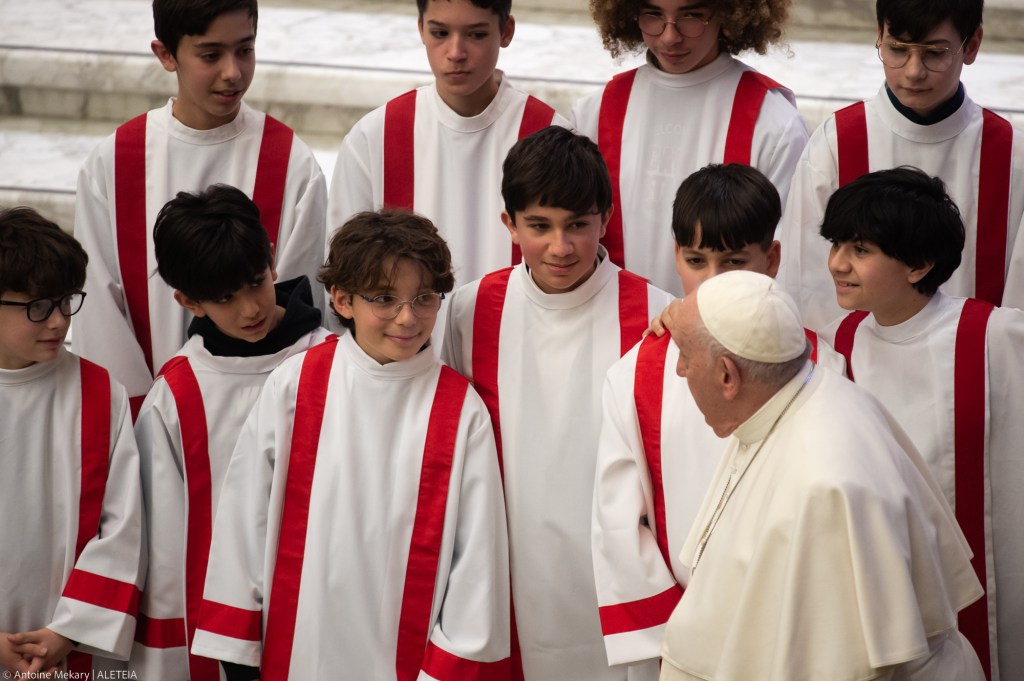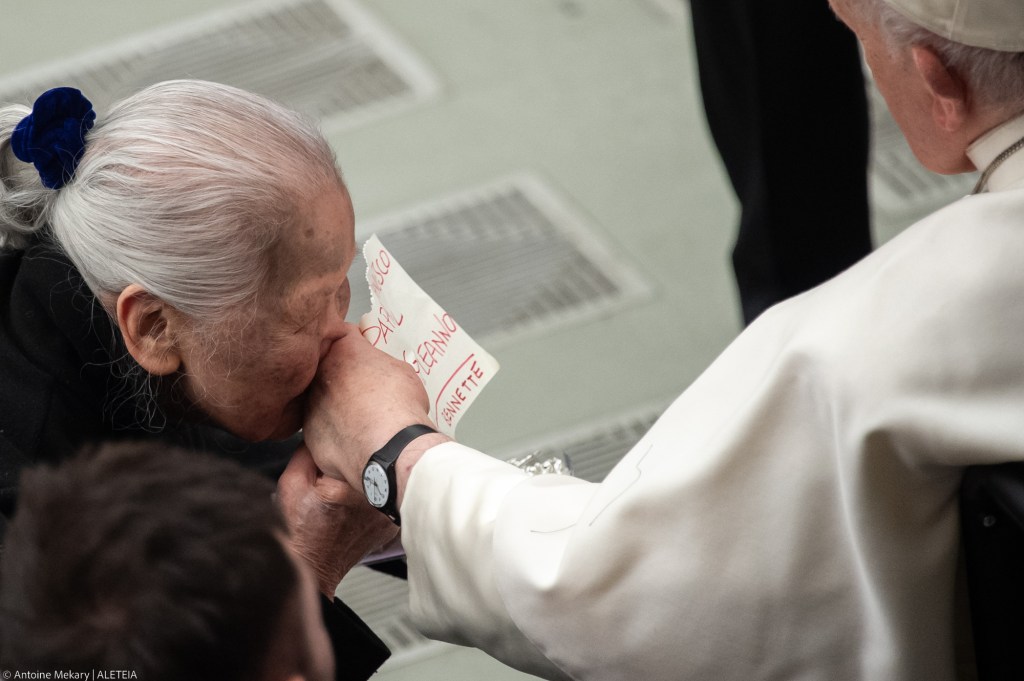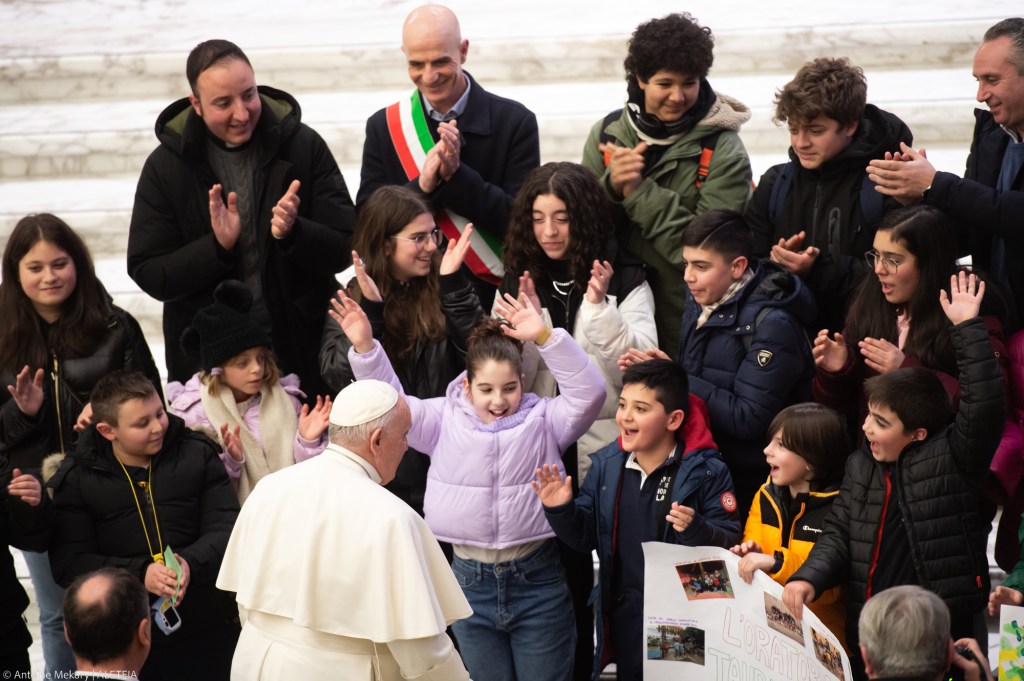Lenten Campaign 2025
This content is free of charge, as are all our articles.
Support us with a donation that is tax-deductible and enable us to continue to reach millions of readers.
Pope Francis says that in order to grow in our Christian formation, we need an experience of mission – that is, of sharing Jesus with others.
The Pope continued his general audience series on the theme of mission, or apostolic zeal, this February 15.
In his characteristic way of drawing unique insights from small details in the Gospel, the Pope first noted:
After having seen in Jesus the model and the master of proclamation, we turn today to the first disciples, to what the disciples did. The Gospel says that Jesus “appointed twelve, to be with Him, and to be sent out to preach” (Mk 3:14), two things: to be with him and to send them to preach.
There is one aspect that seems contradictory: He called them to be with Him and to go and preach. One would say: either one or the other, either stay or go. But no: for Jesus there is no going without staying and there is no staying without going. It is not easy to understand this, but that’s the way it is.
Let us try to understand a little bit what is the sense in which Jesus says these things.
If we don’t spend time with him …
Pope Francis went on to note that if we fail in this “staying” with Jesus, what we give others is not Our Lord, but ourselves.
First of all, there is no going without staying: before sending the disciples on mission, Christ—the Gospel says—“calls them to Himself” (cf. Mt 10:1). The proclamation is born from the encounter with the Lord; every Christian activity, especially the mission, begins from there. Not from what is learnt in an academy. No, no! It begins from the encounter with the Lord.
Witnessing Him, in fact, means radiating Him; but, if we do not receive His light, we will be extinguished; if we do not spend time with Him, we will bear ourselves instead of Him—I am bringing myself and not Him—and it will all be in vain. So only the person who remains with Him can bring the Gospel of Jesus. Someone who does not remain with Him cannot bear the Gospel. He will bring ideas, but not the Gospel.
Equally, however, there is no staying without going. In fact, following Christ is not an inward looking fact: without proclamation, without service, without mission, the relationship with Jesus does not grow.
We note that in the Gospel the Lord sends the disciples before having completed their preparation: shortly after having called them, He is already sending them! This means that the mission experience is part of Christian formation.
Let us then recall these two constitutive moments for every disciple: staying with Jesus and going forth, sent by Jesus.
Why, what, how
The Holy Father went on to explain what the Gospel teaches us about “why proclaim, what to proclaim and how to proclaim.”
~ why proclaim? Because I have received freely, and I should give freely. The proclamation does not begin from us, but from the beauty of what we have received for free, without merit: meeting Jesus, knowing Him, discovering that we are loved and saved.
~ What to proclaim? Jesus says: “Preach as you go, saying, ‘The kingdom of heaven is at hand.’” (v. 7). This is what must be said, first and foremost: God is near. … This closeness is one of the most important things about God. There are three important things: closeness, mercy, and tenderness. Don’t forget that. Who is God? The One Who is Close, the One Who is Tender, the One Who is Merciful.
~ How to proclaim: He does not ask us to be able to face the wolves, that is, to be able to argue, to offer counter arguments, and to defend ourselves. No, no. We might think like this: let us become relevant, numerous, prestigious, and the world will listen to us and respect us and we will defeat the wolves. No, it’s not like that. No, I send you out as sheep, as lambs. This is important. If you don’t want to be sheep, the Lord will not defend you from the wolves. Deal with it as best you can. But if you are sheep, rest assured that the Lord will defend you from the wolves. Be humble. He asks us to be like this, to be meek and with the will to be innocent, to be disposed to sacrifice; this is what the lamb represents: meekness, innocence, dedication, tenderness. And He, the Shepherd, will recognise His lambs and protect them from the wolves.
See the full address with additional points here.





